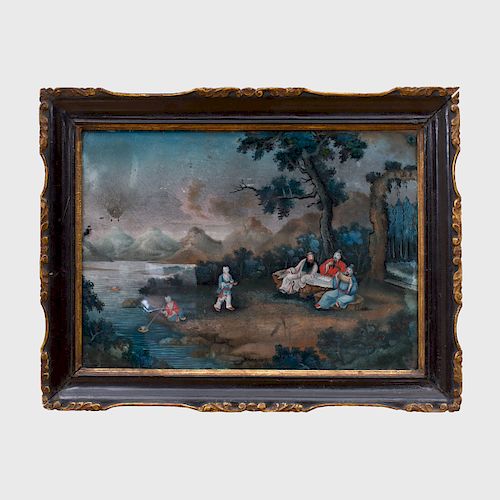Chinese Export Reverse Painting on Glass, The Orchard Pavilion Gathering
Bid Increments
| Price | Bid Increment |
|---|---|
| $0 | $25 |
| $200 | $50 |
| $500 | $100 |
| $3,000 | $250 |
| $5,000 | $500 |
| $10,000 | $1,000 |
| $30,000 | $2,500 |
| $100,000 | $5,000 |
The painting depicting the Lanting Ceremony.
14 1/4 x 20 in. (panel), 18 1/4 x 23 3/4 in. (frame).
Note: The Orchard Pavilion Gathering: On the third day of the third lunar month, the Spring Purification Ceremony (an ancient bath ritual) was celebrated in Lanting, in the modern-day Zhejiang Province. In what became known as the Orchard Pavilion Gathering, distinguished local scholars would gather along the banks of a coursing stream and engaged in a drinking contest know as "Floating Goblets". Servants would place cups of rice wine on large leaves, which would drift down from upstream, and whenever a cup stopped in front of a scholar, he had to compose a poem or else drink the contents and resume the game.
In the ninth year of the Emperor Yonghe (353 CE), the scholars partaking in the Orchard Pavilion Gathering had composed thirty-seven poems by the end of the day. These were compiled and prefaced by the Lantingji Xu manuscript, which esteemed calligrapher Wang Xizhi produced on the spot. His preface forever immortalized the event, and while the original manuscript has long been lost, multiple copies made on paper and stone survive. The Lantingji Xu was written in a semi-cursive 'Running Style' on cocoon paper with a weasel whisker brush, and despite being created by Wang in a state of insobriety, is regarded as the apotheosis of this style of Chinese calligraphy. The Lantingji Xu is also revered for its sentimental meditation on life, death and the transience of delight. Scholars of Wang have referred to his ideology as a fusion of Confucianism, Buddhism and Taoism.
We are grateful to Lily Spicer for her research.







